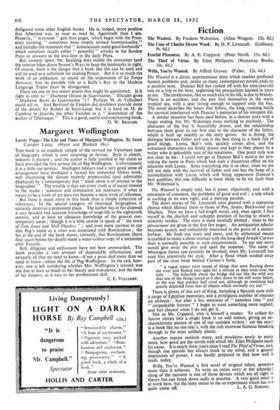Fiction
The Wastrel. By Frederic Wakeman. (Allan Wingate. 12s, 6d.) Fearful Pleasures. By A. E. Coppard. (Peter Nevill. Us. 6d.) Willa, You're Wanted. By Affleck Graves. (Faber. 12s. 6d.) The Wastrel is a direct, unpretentious story which reaches profound human problems and, unlike so many contemporary novels, ends on a positive-note. Duncan Bell has rushed off with his nine-year-old son on a trip in his boat, neglecting the precautions learned in years at sea. The carelessness, like so much else in his life, is due to brandy. There is an accident, and the pair find themselves in the warm tropical sea, with a spar strong enough to support only the boy. The novel describes the hours that follow, the long, cunning battle for survival interleaved with Duncan's memories of his misspent life.
A similar situation has been used before, in a shorter story with a tragic ending, but Mr. Wakeman owes nothing to anybody. The character of the boy is beautifully drawn, and the relationship between them gives us our first clue to the character of the father, which is built up steadily as the story grows. As is fitting, the dialogue between father and son is the best thing in a book full of good things. Lorna, Bell's wife, quickly comes alive, and the subsidiary characters are firmly drawn and kept in their places by a writer who is splendidly sure of his intentions. One point only was not clear to me. I could not get at Duncan Bell's motive for pro- voking the scene in Paris which had such a disastrous effect on his relations with Lorna. Since everything else is so clear, since we are left not only with the survival of father and son but the hope of a reconciliation with Lorna which will bring uppermost Duncan's best qualities, this one difficulty is more likely to be my fault than Mr. Wakeman's.
The Wastrel is simply told, but it poses, objectively, and with a minimum of comment, the problems of good and evil ; a tale which is exciting in its own right, and a moving parable.
The short stories of Mr. Lovecraft were greeted with a rapturous chorus which likened them to those of Poe, James, Blackwood and Machen. Now we have a full-length novel, and, once again, I find myself in the churlish and unhappy position of having to return a minority verdict. The story is most carefully plotted ; clues to the denouement are given in the first few pages. An antiquarian scholar becomes acutely and unhealthily interested in the grave of a sinister forbear. He finds out more and more, and by alchemical means is enabled to make a closer contact with the long-dead Joseph Curwen than is normally possible in such circumstances. To say any more would give away the plot and spoil the suspense. The name of Montague James can certainly be invoked, since Mr. Lovecraft has read him attentively for style. After a flood which washed away part of the river bank behind Curwen's farm, "a vague report went round of things that Fere floating down the river and flashed into sight for a minute as they went over the falls.. . . The fisherfolk about the bridge did not like the wild way that one of the things stared as it shot down to the still water below, or the way that another half cried out, although its condition had greatly departeIl from that of objects which normally cry out."
There is plenty of this sort of thing, including a Spanish scow with a cargo of Egyptian mummies, and a prodigious number of treatises on alchemy : but after a few mentions of " nameless rites" and "unspeakable horrors" I begin to want something more explicit, and feel cheated when I do not get it. Not so Mr. Coppard, who is himself a master. To collect his horror stories into a single book is an odd notion, giving an un- characteristic picture of one of our sunniest writers : yet the result is a book like no one else's, with the rich slantwise humour breaking through in the most unlikely places.
Another reprint reminds many, and proclaims newly to many more, how good are the novels with which Mr. Eden Phillpotts made his name. It is nearly forty years since I read The Thief of Virtue, and, though one episode has always stuck in my mind, and a general impression of power, I was hardly prepared to find how well it reads today.
Willa, You're Wanted, a first novel of original talent, promises more than it achieves. To write an entire story in the schoolgirl slang-of the narrator is one of those devices which are all right in theory but can break down sadly in practice. A very good mind is at work here, but the story seems to me an experiment which has not


































 Previous page
Previous page